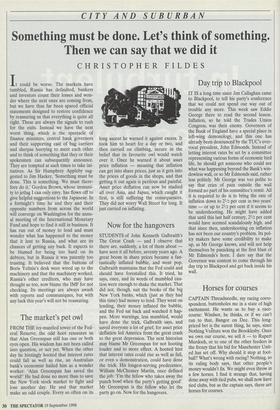Now for the hangovers
STUDENTS of John Kenneth Galbraith's The Great Crash — and I observe that there are, suddenly, a lot of them about have seen it all before, seventy years ago. A great boom in share prices became a fan- tastically inflated bubble, and went pop. Galbraith maintains that the Fed could and should have forestalled this. It tried, he says, once, and its words of mumbled cau- tion were enough to shake the market. That did not, though, suit the books of the big New York banks, which (just as they had this time) had money to lend. They went on lending, their money inflated the bubble, and the Fed sat back and watched it hap- pen. More warnings, less mumbled, would have done the trick, Galbraith says, and saved everyone a lot of grief, for asset price deflation led America from the great crash to the great depression. The next historian may blame Mr Greenspan for not hooting louder and to more effect. A hooted hint that interest rates could rise as well as fall, or even a demonstration, could have done the trick. His longest-serving predecessor, William McChesney Martin, once defined the job: 'I'm the fellow who takes away the punch bowl when the party's getting good'. Mr Greenspan is the fellow who let the party go on. Now for the hangovers.










































































 Previous page
Previous page